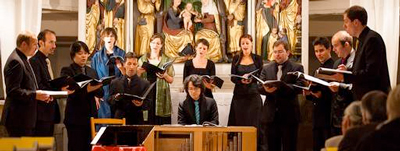by Daniel Hathaway

And if they hadn’t made such dramatic use of the cathedral space. Vox Luminis began the concert out of sight behind the high altar with atmospheric performances of Thomas Tallis’s O nata lux (studded with delicious cross-relations) and Purcell’s 8-voice Hear my prayer, O Lord, establishing the choir’s meticulous tuning and vocal blend.
During the latter, a gambist, organist, and tenor — all unidentified — slowly took their places for Purcell’s Evening Hymn, a yearningly expressive set of vocal variations over a simple ground bass line. Eight singers gathered for William Byrd’s Ave verum corpus (with more delicious cross-relations), then only five for Robert White’s strophic Christe qui lux est et dies, its verses separated by chant.
Then we found ourselves in Westminster Abbey for Morley’s Music for the Funeral of Queen Elizabeth and Purcell’s Funeral Sentences for Queen Mary, separated by Purcell’s O dive custos (an elegy on the death of Queen Mary with references to the House of Orange and the rivers of Oxford and Cambridge). Morley’s music, sung by nine voices with organ, was chaste and solemn, Purcell’s more dramatic — although Purcell was organist at the Abbey, he had one foot planted firmly in the theater. The elegy, for two sopranos, gamba, and organ, featured a sinking vocal line as striking as the Funeral Sentences’ ascending figures during the anthem “In the midst of life.”
The evening ended in solemnity. Purcell’s Remember not, Lord, our offences is a setting of the prayer that during the Middle Ages got tacked onto the long canticle called Te Deum. On this program it sounded a note of repentance in the face of death.
Though rapturous applause at funeral rites might seem out of place, the large audience gave Vox Luminis a resounding ovation. Meunier decided on a literal encore, a second performance of Purcell’s Hear my prayer, this time with the choir in full sight and the motet’s rich harmonies in full earshot. A splendid end to an evening of sober but exquisitely beautiful music.
Photo: Vox Luminis performing in Germany.
Published on ClevelandClassical.com May 9, 2017.
Click here for a printable copy of this article


